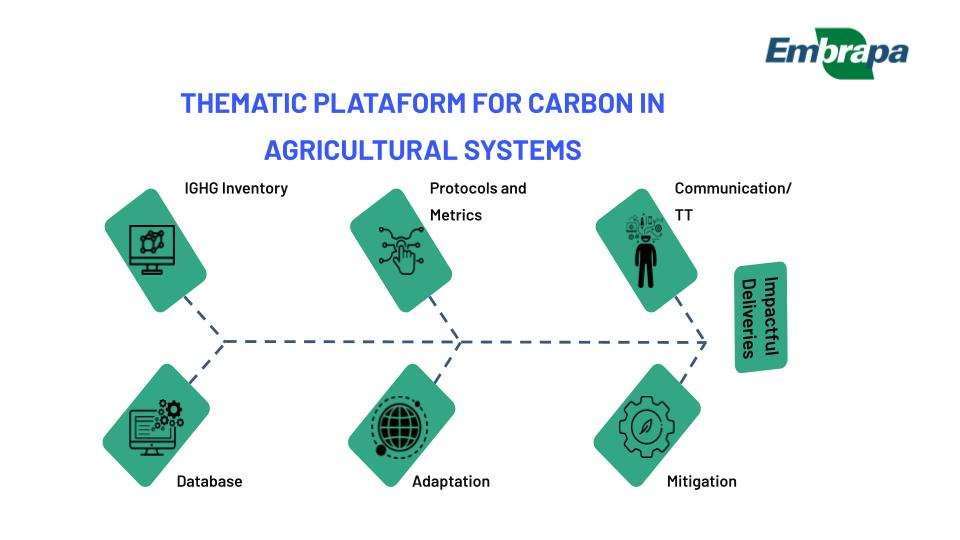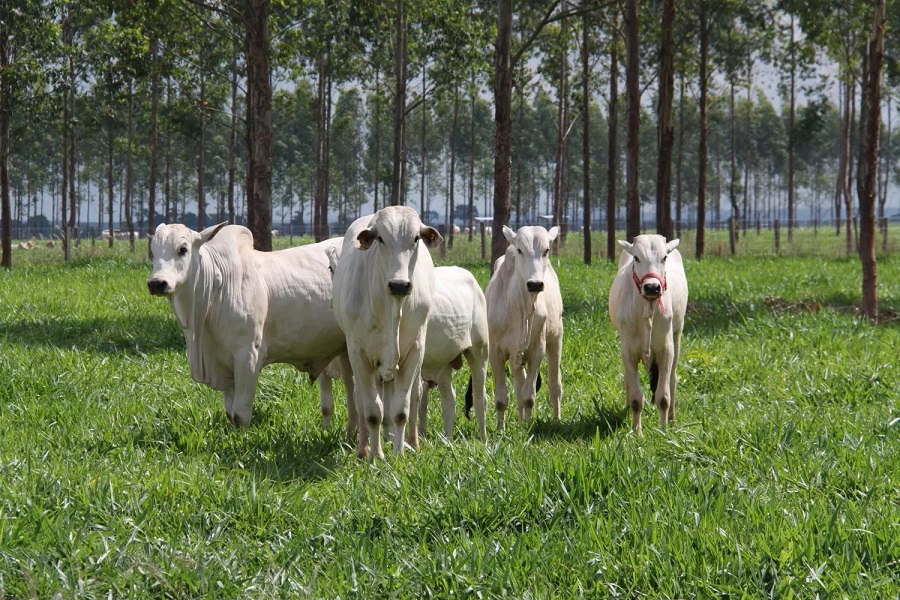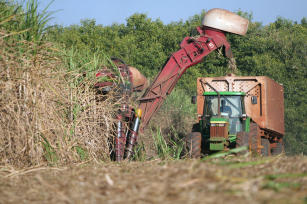The initiative will draw partners to jointly research the dynamics of carbon in agri-food and forestry systems Embrapa's Integra-C is an initiative aimed at aggregating data and research, development and innovation (RD&I) findings generated by the corporation and by partner institutions, which can contribute to reducing greenhouse gas (GHG) emissions and removals in agri-food and forestry systems in the face of climate change. In addition, it will contribute to increasing the competitiveness and sustainability of production chains and to strengthening the adoption of good management practices. The newly created thematic platform on carbon in agricultural systems brings over 50 experts together to define data, functionalities and metrics that are adapted to the tropical conditions of Brazilian agricultural systems, in line with the methods of the Intergovernmental Panel on Climate Change (IPCC). For Embrapa's Director of Research and Innovation, Clenio Pillon, this initiative represents a strategic milestone for Embrapa and for Brazil, as the development of carbon balance metrics that are adaptated to Brazilian agriculture meets a strong international demand for the traceability of emissions. At the same time, it ensures the sustainability of national agriculture, which needs to offer answers based on globally recognized standardized parameters. "In addition, the platform will allow us to visualize the top deliveries that we can make in the next 10 to 20 years with regard to GHG mitigation and improvement of sustainable practices in agri-food and forestry systems, in connection with global agreements and national public policies," he adds. The project stipulates investment in infrastructure and the establishment of a RD&I cooperation network, which will allow the elaboration of measurement methods that are appropriate for national conditions and production model, similarly to what already happens in the United States, the European Union and other developed countries. Click here to learn more about the platform. Embrapa's Integra-C paves the way for innovation The expectation is that Embrapa's Integra-C will support the platform in order to raise funds not only to strengthen research and development activities, but also the transfer of technologies to the production sector. "One of the planned actions is to put together a "carbon caravan", like FertBrasil, which traveled throughout Brazil disseminating technologies and knowledge to increase the efficiency of fertilizer use," Pillon says. All of that effort aims to foster understanding of the peculiarities of tropical production systems, including soil characteristics and natural environments, at an international level. “This is an agenda that can also be strategic for other tropical countries, which opens up the possibility of partnerships to strengthen the specific needs of such production environments in the face of the impacts of climate change”, the director states. The goal is to contribute not only to increasing the competitiveness of the agricultural sector and its commercial impact on national and international markets as Brazil's international commitments are fulfilled, but also to predictability and risk management for the sake of sustainability in agriculture. Actions target different production systems The initiative covers several courses of action, which include solutions for different production systems: Development of a virtual dashbord (database, functionalities and metrics) on carbon balance in Brazil's main agricultural systems Improvement of alternative techniques for field data collection. Risk monitoring, adaptation and sustainability of local production systems. Development of infrastructure monitoring and maintenance plan in the medium and long term Establishment of cooperation and technology transfer networks Some activities have already started, such as a survey across Embrapa's research network to obtain information on infrastructure, data, experiments, and monitoring areas available. Benefits Expanded competitiveness of the agricultural sector on the international stage. Promotion of risk analysis and management in agriculture. Contribution of information for the National Inventory of Greenhouse Gas (GHG) Emissions. Development of metrics to quantify carbon emissions and removals and national indicators. Contribution to the achievement of targets stipulated in the Paris Agreement Other technologies In addition to the thematic platform, other technologies comprise Embrapa's Integra-C, including the following: Plataform for soil analysis in precision agriculture and carbon market projects RenovaCalc: RenovaBio's carbon intensity Calculator Integrated Crop-Livestock-Forestry Systems (ICLFS) PronaSolos Data Portal on SIGWeb environment
The initiative will draw partners to jointly research the dynamics of carbon in agri-food and forestry systems
Embrapa's Integra-C is an initiative aimed at aggregating data and research, development and innovation (RD&I) findings generated by the corporation and by partner institutions, which can contribute to reducing greenhouse gas (GHG) emissions and removals in agri-food and forestry systems in the face of climate change. In addition, it will contribute to increasing the competitiveness and sustainability of production chains and to strengthening the adoption of good management practices.
The newly created thematic platform on carbon in agricultural systems brings over 50 experts together to define data, functionalities and metrics that are adapted to the tropical conditions of Brazilian agricultural systems, in line with the methods of the Intergovernmental Panel on Climate Change (IPCC).

For Embrapa's Director of Research and Innovation, Clenio Pillon, this initiative represents a strategic milestone for Embrapa and for Brazil, as the development of carbon balance metrics that are adaptated to Brazilian agriculture meets a strong international demand for the traceability of emissions. At the same time, it ensures the sustainability of national agriculture, which needs to offer answers based on globally recognized standardized parameters. "In addition, the platform will allow us to visualize the top deliveries that we can make in the next 10 to 20 years with regard to GHG mitigation and improvement of sustainable practices in agri-food and forestry systems, in connection with global agreements and national public policies," he adds.
The project stipulates investment in infrastructure and the establishment of a RD&I cooperation network, which will allow the elaboration of measurement methods that are appropriate for national conditions and production model, similarly to what already happens in the United States, the European Union and other developed countries.
Click here to learn more about the platform.
Embrapa's Integra-C paves the way for innovation
The expectation is that Embrapa's Integra-C will support the platform in order to raise funds not only to strengthen research and development activities, but also the transfer of technologies to the production sector. "One of the planned actions is to put together a "carbon caravan", like FertBrasil, which traveled throughout Brazil disseminating technologies and knowledge to increase the efficiency of fertilizer use," Pillon says.
All of that effort aims to foster understanding of the peculiarities of tropical production systems, including soil characteristics and natural environments, at an international level. “This is an agenda that can also be strategic for other tropical countries, which opens up the possibility of partnerships to strengthen the specific needs of such production environments in the face of the impacts of climate change”, the director states.
The goal is to contribute not only to increasing the competitiveness of the agricultural sector and its commercial impact on national and international markets as Brazil's international commitments are fulfilled, but also to predictability and risk management for the sake of sustainability in agriculture.
Actions target different production systems The initiative covers several courses of action, which include solutions for different production systems: - Development of a virtual dashbord (database, functionalities and metrics) on carbon balance in Brazil's main agricultural systems
- Improvement of alternative techniques for field data collection.
- Risk monitoring, adaptation and sustainability of local production systems.
- Development of infrastructure monitoring and maintenance plan in the medium and long term
- Establishment of cooperation and technology transfer networks
Some activities have already started, such as a survey across Embrapa's research network to obtain information on infrastructure, data, experiments, and monitoring areas available. |
Benefits - Expanded competitiveness of the agricultural sector on the international stage.
- Promotion of risk analysis and management in agriculture.
- Contribution of information for the National Inventory of Greenhouse Gas (GHG) Emissions.
- Development of metrics to quantify carbon emissions and removals and national indicators.
- Contribution to the achievement of targets stipulated in the Paris Agreement
Other technologies In addition to the thematic platform, other technologies comprise Embrapa's Integra-C, including the following: |



